|
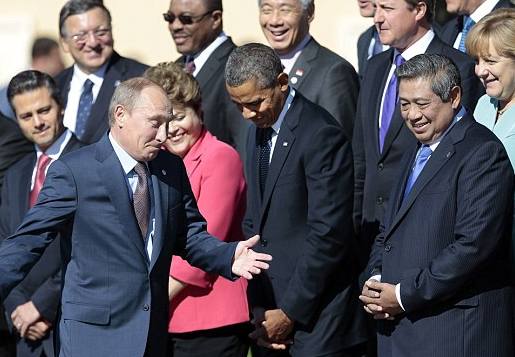
Vladimar
effectively says its war if you attack Syria - putting Obama in his
place
SYRIAN
CIVIL WAR
Since the Syrian civil war began, the Armed Forces have been sent to fight the insurgents. As the uprising progressed into civil war, many soldiers began to defect from the Syrian Armed Forces and came together under the banner of the Free Syrian Army. In March 2012, the Syrian government issued new travel restrictions for military-aged males. Under the new restrictions, reported by local Syrian news outlets, all males between 18 and 42 were banned from traveling outside the country. In a late June 2012 interview given by the FSA's Alsharq Al Awsat he claimed Riad al-Asaad said that about 20-30 Syrian officers defected to Turkey each day.
On 18 July 2012 Syrian Defence Minister Dawoud Rajha, former defence minister Hasan Turkmani, and the president's brother-in-law General Assef Shawkat were killed by a bomb attack in Damascus. The Syrian intelligence chief Hisham Bekhityar, and Head of the 4th Army Division Maher Al Assad brother to President Assad were also injured in the same explosion.
Since the start of the Syrian civil war, human rights groups report that the majority of abuses have been committed by the Syrian government's forces, and
UN investigations have concluded that the government's abuses are the greatest in both gravity and scale. The branches of the Syrian Armed Forces that have committed war crimes include at least the Syrian Arab Army, Syrian Arab Air Force and the Syrian Military Intelligence.
RUSSIAN
AID
Mr Putin promised to "help" President Bashar al-Assad's regime in the event of a US campaign, showing how Russia and America had failed to narrow their differences over the Syrian civil war during a tense
G20 summit in St Petersburg.
President Barack Obama and his Russian counterpart could not even agree on the factual point of whether a majority of G20 members supported or opposed military action.
Mr Obama said that most of the 19 countries represented at St Petersburg had backed the US position – and 11 duly signed a statement urging a "strong international response" to the poison gas attacks in Damascus.
But Mr Putin disputed this, pointing out that although David Cameron might have signed the statement, Parliament's vote against British military action showed that the Prime Minister did not speak for his country.
Ending the summit, Mr Putin said that world opinion was firmly against US-led intervention, adding that Russia would take Syria's side. "Will we help Syria? We will," he said. "We are already helping, we send arms."

We
are supplying arms to Syria, what are you going to do about it big boy?
6
SEPTEMBER 2013 TELEGRAPH
A week after the vote in Parliament against British involvement in a possible
military strike against Syria, the geopolitical implications of that decision are becoming clearer. At the G20 summit in St Petersburg, it seemed the Russian hosts thought it amusing to taunt David Cameron about his difficulties. One of President Vladimir Putin’s aides allegedly said in private that Britain is a “small island no one listens to”. The jibe has been denied; but is there some truth in it?
At the summit, Mr Cameron has cut a somewhat forlorn figure, not entirely irrelevant but not entirely relevant either. With the Syrian crisis the most pressing international issue of the moment, the United Kingdom has decided to sit among the spectators, rather than take to the pitch. This is disputed, of course: we are taking the lead in
co-ordinating humanitarian assistance, said Mr Cameron. For good measure, he reminded everyone that we also defeated slavery and fought fascism. All true, but it sounded like a desperate plea for attention.
There has been much analysis of the botched handling of the Syrian vote – the rushed recall of MPs, the failure to prepare the ground, the complacent assumption that the result was a formality and the artful duplicity of
Ed Miliband, for whom political point-scoring mattered more than the interests of the nation. But to foreign observers these procedural niceties and party political shenanigans are of little consequence. What they want to know is whether this country is retreating from the world stage.
It is a good question to ask because there are signs that we are. The Strategic Defence and Security Review, for instance, was emblematic of this tendency. At a time of austerity, the Coalition decided to cut our Armed Forces and reduce their global reach, while at the same time significantly increasing our foreign aid budget. Certainly, the compassionate motivations behind helping the world’s most deprived people may be laudable; but it cannot be denied that the Government chose altruism over might.
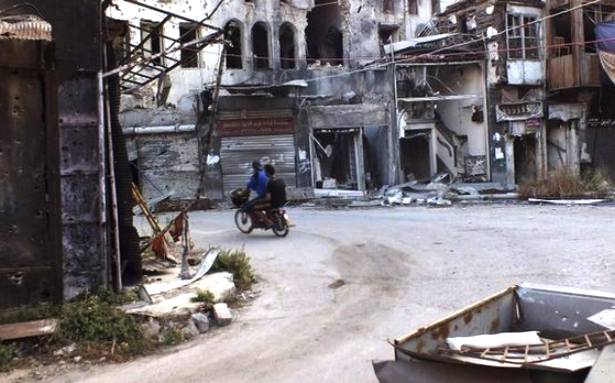
Two
tourists take a quick whiz around the town looking for a burger bar.
6
SEPT 2013 DAILY MAIL
Russia last night issued a chilling threat to assist Syria if the
US leads military strikes against its hated regime.
As a summit of world leaders broke up in acrimony, Vladimir Putin declared openly that he is already supplying arms to Syrian tyrant Bashar Assad and vowed to step up support if a planned missile attack goes ahead.
There were gasps as the Russian President made his remarks after being asked how he would react if Barack Obama proceeds with an attack in response to Syria’s used of chemical weapons.
‘Will we help Syria? We will. And we are already helping, we send arms, we cooperate in the economics sphere,’ Mr Putin declared.
Amid signs any US-led action could be delayed for as long as a fortnight, with President Barack Obama battling to win the approval of Congress, Russia last night sent a fourth warship with ‘unspecified cargo’ to the eastern
Mediterranean.
While few observers expect Mr Putin to deploy his forces in the event of a US-led missile strike on Damascus, Mr Putin’s remarks suggest he is determined to prop up Assad’s rule.
He has already suggested he could renew a suspended contract to supply Syria with a sophisticated missile shield.
Despite what the US, the UK and EU countries again said was conclusive evidence Assad was behind a sarin attack that killed almost 1,500 civilians, including 500 children, last month, the Russian leader insisted rebel forces trying to overthrow the Syrian leader had staged the incident.
He said it was a ‘provocation by militants expecting aid’ and insisted that military action without the approval of the United Nations Security Council would ‘violate international law’.
He insisted most people in the US, UK and other countries calling for military intervention did not support it - and also pointed out the Pope had made clear the ‘inadmissability’ of such a move.
Last night, Russia issued a 27-page document on the conclusions of the G20 that made no mention of Syria, though the crisis had dominated discussions at St Petersburg.
In an unprecedented act of defiance for any recent international summit, eleven countries, including the US and the UK, issued their own statement demanding a ‘strong international response to the grave violation of the world’s rules and conscience’ by Assad’s regime.
The countries, which also included Australia, Canada, France, Italy, Japan, South Korea, Saudi Arabia, Spain and Turkey, said they would ‘support efforts undertaken by the United States and other countries to reinforce the prohibition on the use of
chemical weapons’.
Obama vs Putin on Syria
Mr Cameron, whose failure to win the support of Parliament for British participation on military action was ridiculed by Mr Putin, attacked the ‘dangerous doctrine’ that military action is only legal with United Nations backing.
He said Britain and other Western nations could not ‘contract out our foreign policy, our morality, to the potential of a Russian veto’.
Insisting Mr Obama is no ‘warmonger’, the Prime Minister said world leaders would set an appalling precedent if they failed to respond to the use of chemical weapons.
‘Everyone will pay a price,’ he said.
After more than hours of fruitless talks that went on into the early hours of the morning, Mr Cameron insisted Russia’s claim the Syrian rebels - not Assad’s hated regime -- were responsible for a gas attack killing nearly 1,500 people was ‘miles from the truth’.
The Prime Minister attacked the argument made by countries opposing US-led missile strikes on Damascus that any intervention made without the approval of the UN Security Council would be illegal, even on humanitarian grounds.
‘The argument that did flare up at the dinner last night is a disagreement about whether it’s possible to have legal military engagement outside the UN Security Council,’ he said.
‘Our strong legal advice is that there is a case for humanitarian intervention. There was a strong argument from some that unless there is a Security Council resolution there is no legal basis for action.
‘I think it’s a very dangerous doctrine. If you accept that, you could have a country massacring half its people, a blockage at the
UN Security Council, and no-one could act.
‘It was brought home to me last night that quite aside from the Syrian problem we need to make that argument very vigorously with countries like
South Africa, Brazil,
India and others.
‘One of the frustrations of last night is you have countries - including Security Council permanent members - saying all this must be decided by the UN Security Council, and yet they are the very countries that are blocking any action and have been blocking resolutions for the last two and a half years.’
Mr Cameron said it had been clear that the G20 was ‘never going to reach conclusions about Syria’, adding: ‘The divisions are too great.’
Attacking Russian intransigence, he said: ‘The Russian position that, as Putin has said, if it is proved it is Assad he will take a different view but he is fairly clear that it is the opposition, is miles away from what I think the truth is and miles away from what lots of us believe.
‘He says to me that he would like to see further evidence of regime culpability and we will go on providing evidence of regime culpability, as will the Americans and others, but I think it will take a lot to change his mind.’
Mr Cameron, whose plan to join US-led military action was scuppered last week when MPs voted against, yesterday offered another £52 million in aid to help the millions who have fled the Assad regime.
He asked President Putin to put pressure on the Syrian regime to agree safe corridors along which aid convoys could pass without coming under attack from either side in its civil war.
Mr Cameron suggested the UN Security Council could be asked to endorse such a plan.
‘I have never heard the Russians argue against humanitarian access. It may well be necessary at some stage to go back to the UN and that will test whether the Russians will support it,’ he said.
‘There’s a case at some stage for writing down all the things that need to happen in terms of access and getting UN support for it. It might be necessary to get a UN resolution.’
Amid growing signs in the US that Mr Obama could struggle to get approval from Congress for his plans, Mr Cameron said he was making a ‘powerful argument... as someone who is trying to extract himself from Middle East entanglements and he is no way seen as a warmonger’.
Last night the US ordered its diplomats to leave neighbouring Lebanon as Congress debates Syria military strikes.
President Obama insisted military action was right even if the public was largely against it, saying US intervention in the Second World War had also been opposed by a majority.
As he left the summit, the US leader said: ‘I’m not drawing an analogy to World War II other than to say that when London was getting bombed, it was profoundly unpopular, both in Congress and around the country to help the British. Doesn’t mean it wasn’t the right thing to do.’
5
SEPT 2013 BBC SYRIA REPORT - DAVID BOWEN
World leaders are locked in a divisive debate over Syria, at the end of the first day of the
G20 summit in Russia.
Opening the summit, Russian President Vladimir Putin confirmed Syria would be discussed at the working dinner.
US President Barack Obama is pushing for support for military strikes. Russia and China have warned the US not to take action without UN backing.
Meanwhile, Syria's parliamentary speaker has written to the speaker of the US House of Representatives.
In his letter to John Boehner, Mohammed Jihad al-Lahham urged the US Congress not to rush into what he called "irresponsible, reckless action".
Mr Putin, in his opening remarks, told the leaders gathered in St Petersburg that some participants had asked for time to discuss "very acute topics of international politics, in particular the situation around Syria", even though it is not on the agenda.
"I suggest we do this during dinner so that we... in the first part can discuss the [economic] problems we had gathered here for," he said.
The BBC's Bridget Kendall in St Petersburg says, in the short-term, the leaders can only hope that their discussion over Syria at dinner does not descend into an even more bitter row than it is already.
The government of Syrian President Bashar al-Assad is accused of using chemical weapons against civilians on several occasions during the 30-month conflict.
The US said the most recent attack took place on 21 August on the outskirts of Damascus and had killed 1,429 people. It released an intelligence assessment blaming the Syrian government.
German and US media reports published further analysis on Thursday both claiming that the gas used in the attack was more potent than expected, and that Syrian forces may have got the mix wrong.
UK Prime Minister David Cameron has told the BBC British scientists have uncovered further evidence linking the Damascus attack to the use of chemical weapons.
Mr Assad's government has denied involvement and said the rebels were responsible.
Some 100,000 people have died in the conflict, and more than two million Syrians are classified as refugees, according to the UN.
On the G20 sidelines, Mr Putin's spokesman once again dismissed the US intelligence assessment on the Damascus attack.
"We can't accept proof that is a long way from being convincing," said Dmitry Peskov.
Mr Obama, who is trying to build support in the US for military action against the Syrian government, held informal talks with Japanese Prime Minister Shinzo Abe over the issue.
Mr Obama said Japan and the US had a "joint recognition" that the use of chemical weapons in Syria was a tragedy and a violation of international law.
Mr Abe has not stated publicly whether he supports military strikes.
In the run-up to the summit, the US and Russia have engaged in tit-for-tat insults.
US Secretary of State John Kerry accused Russia of "obstructionism", and Mr Putin responded by calling Mr Kerry a "liar".
On Thursday, the US envoy to the UN continued the tough rhetoric, accusing Russia of holding the UN Security Council hostage.
Samantha Power said that Russia, which has twice blocked resolutions on Syria, had ensured that there was "no viable path" for action through the Security Council.
SYRIA
HISTORY
Syria, officially the Syrian Arab Republic, is a country in Western Asia, bordering Lebanon and the Mediterranean Sea to the West, Turkey to the north, Iraq to the east, Jordan to the south and Israel to the southwest. A country of fertile plains, high mountains and deserts, it is home to diverse ethnic and religious groups, including Kurds, Armenians, Assyrians, Turks, Christians, Druze, Alawite Shias and Arab Sunnis. The latter make up the majority of the population.
In English, the name "Syria" was formerly synonymous with the Levant (known in Arabic as al-Sham) while the modern state encompasses the sites of several ancient kingdoms and empires, including the Eblan civilization of the third millennium BC. In the Islamic era, its capital city, Damascus, among the oldest continuously inhabited cities in the world, was the seat of the Umayyad Caliphate, and a provincial capital of the Mamluk Sultanate of Egypt.
The modern Syrian state was established after the First World War as a French mandate, and represented the largest Arab state to emerge from the formerly Ottoman-ruled Arab Levant. It gained independence in April 1946, as a parliamentary republic. The post-independence period was tumultuous, and a large number of military coups and coup attempts shook the country in the period 1949–1971. Between 1958 and 1961, Syria entered a brief union with Egypt, which was terminated by a military coup. Syria was under Emergency Law from 1963 to 2011, effectively suspending most constitutional protections for citizens, and its system of government is considered to be non-democratic. Bashar al-Assad has been president since 2000 and was preceded by his father Hafez al-Assad, who was in office from 1970 to 2000.
ABOUT
SYRIA
Syria is a member of one international organization other than the
United
Nations, the Non-Aligned Movement; it is currently suspended from the Arab League and the Organisation of Islamic Cooperation, and self-suspended from the Union for the Mediterranean.
Since March 2011, Syria has been embroiled in civil war in the wake of uprisings (considered an extension of the Arab Spring, the mass movement of revolutions and protests in the Arab world) against Assad and the neo-Ba'athist government. An alternative government was formed by the opposition umbrella group, the Syrian National Coalition, in March 2012. Representatives of this government were subsequently invited to take up Syria's seat at the Arab League. The opposition coalition has been recognised as the "sole representative of the Syrian people" by several nations including the United States, the United Kingdom and France.
GEOGRAPHY
Syria lies between latitudes 32° and 38° N, and longitudes 35° and 43° E. It consists mostly of arid plateau, although the northwest part of the country bordering the Mediterranean is fairly green. The Northeast of the country "Al Jazira" and the South "Hawran" are important agricultural areas. The Euphrates, Syria's most important river, crosses the country in the east. It is considered to be one of the fifteen states that comprise the so-called "Cradle of civilization".
The climate in Syria is dry and hot, and winters are mild. Because of the country's elevation, snowfall does occasionally occur during winter. Petroleum in commercial quantities was first discovered in the northeast in 1956. The most important oil fields are those of Suwaydiyah, Qaratshui, Rumayian, and Tayyem, near Dayr az–Zawr. The fields are a natural extension of the Iraqi fields of Mosul and Kirkuk.
Petroleum became Syria's leading natural resource and chief export after 1974. Natural gas was discovered at the field of Jbessa in 1940.
MILITARY
The President of Syria is commander in chief of the Syrian armed forces, comprising some 400,000 troops upon mobilization. The military is a conscripted force; males serve in the military upon reaching the age of 18. The obligatory military service period is being decreased over time, in 2005 from two and a half years to two years, in 2008 to 21 months and in 2011 to year and a half. About 20,000 Syrian soldiers were deployed in Lebanon until 27 April 2005, when the last of Syria's troops left the country after three decades.
The breakup of the Soviet Union — long the principal source of training, material, and credit for the Syrian forces — may have slowed Syria's ability to acquire modern military equipment. It has an arsenal of surface-to-surface missiles. In the early 1990s, Scud-C missiles with a 500-kilometer range were procured from North Korea, and Scud-D, with a range of up to 700 kilometers, is allegedly being developed by Syria with the help of North Korea and Iran, according to Zisser.
Syria received significant financial aid from Persian Gulf Arab states as a result of its participation in the Persian Gulf War, with a sizable portion of these funds earmarked for military spending.
SYRIAN
NAVY
In
1950, the Syrian
Navy was established following the procurement of a few naval craft
from France. The initial personnel consisted of soldiers who had been
sent to French academies of naval training. In 1985, the navy consisted
of approximately 4,000 regular and 2,500 reserve officers and men. The
navy is under the army's Latakia regional command. The fleet was based
in the ports of Latakia, Baniyas, Minat al Bayda, and Tartus. Among the
41 vessel fleet were 2 frigates, 22 missile attack craft (including 10
advanced Osa
II missile boats), 2 submarine
chasers, 4 mine
warfare vessels, 8
gunboats, 6 patrol craft, 4 missile corvettes (on order), 3 landing
craft (on order), 1 torpedo recovery vessel and, as part of its coastal
defence system, Sepal shore-to-sea missiles with a range of 300
kilometers.
During the Yom Kippur War the Israeli Navy sank five Syrian ships without a loss during the Battle of Latakia. As a result the Syrian Navy remained in port for the rest of the conflict.
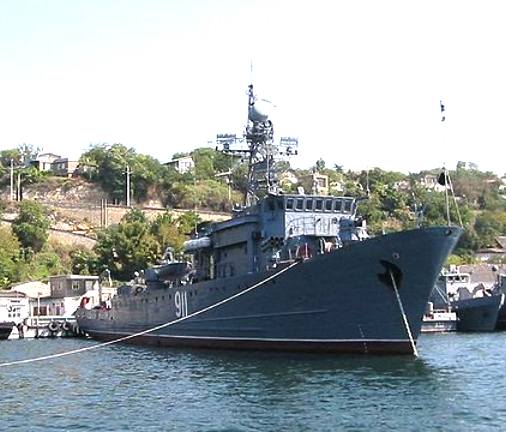
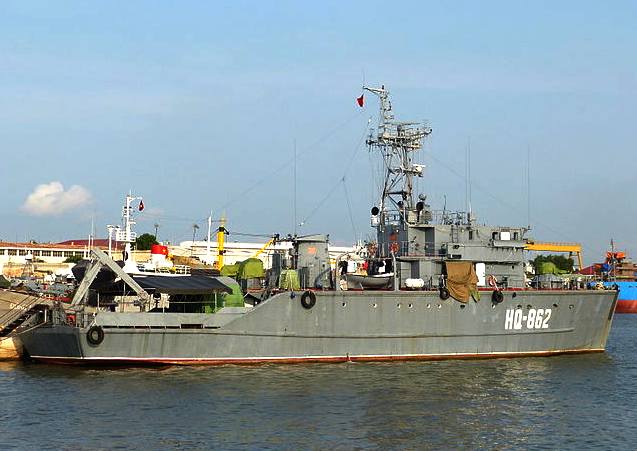
Natya
and Sonya class mine hunters as used by the Syrian Navy
TARTUS
Tartus hosts a Soviet-era naval supply and maintenance base, under a 1971 agreement with Syria. The base was established during the Cold War to support the Soviet Navy's fleet in the Mediterranean Sea. Since Russia forgave Syria of three-fourths of its $13.4 billion Soviet-era debt and became its main arms supplier, Russia and Syria have conducted talks about allowing Russia to develop and enlarge its naval base, so that Russia can strengthen its naval presence in the Mediterranean.
Amid Russia's deteriorating relations with the West, because of the 2008 South Ossetia War and plans to deploy a US missile defense shield in Poland, President Assad agreed to the port’s conversion into a permanent Middle East base for Russia’s nuclear-armed warships. Since 2009, Russia has been renovating the Tartus naval base and dredging the port to allow access for its larger naval vessels.
During the Syrian civil war, it is claimed that Syrian Navy warships supported a military attack by government forces against rebels in the town of Latakia. Syrian Rebels have attempted to recruit fishermen to stop shipments of weapons to the coast.
ECONOMY
Syria is classified by the World Bank as a "lower middle income country." Syria remains dependent on the oil and agriculture sectors. The oil sector provides about 40% of export earnings. The agriculture sector contributes to about 20% of GDP and 20% of employment. Oil reserves are expected to decrease in the coming years and Syria has already become a net oil importer. Since the civil war began, the economy shrank by 35%, and the Syrian pound has fallen to one-sixth of its prewar value. The government increasingly relies on credit from Iran, Russia and China.
The economy is highly regulated by the government, which has increased subsidies and tightened trade controls to assuage protesters and protect foreign currency reserves.[94] Long-run economic constraints include foreign trade barriers, declining oil production, high unemployment, rising budget deficits, and increasing pressure on water supplies caused by heavy use in agriculture, rapid population growth, industrial expansion, and water pollution. The UNDP announced in 2005 that 30% of the Syrian
population lives in poverty and 11.4% live below the subsistence level.
Syria's main exports include crude oil, refined products, raw cotton, clothing, fruits, and grains. The bulk of Syrian imports are raw materials essential for industry, vehicles, agricultural equipment, and heavy machinery. Earnings from oil exports as well as remittances from Syrian workers are the government's most important sources of foreign exchange.
Syria’s share in global exports has eroded gradually since 2001.[95] The real per capita GDP growth was just 2.5% per year in the 2000–2008 period. Unemployment is high at above 10%. Poverty rates have increased from 11% in 2004 to 12.3% in 2007.
Political instability poses a significant threat to future economic development. Foreign investment is constrained by violence, government restrictions, economic sanctions, and international isolation. Syria’s economy also remains hobbled by state bureaucracy, falling oil production, rising budget deficits, and inflation.
Prior to the civil war in 2011, the government hoped to attract new investment in the tourism, natural gas, and service sectors to diversify its economy and reduce its dependence on oil and agriculture. The government began to institute economic reforms aimed at liberalizing most markets, but those reforms were slow and ad hoc, and have been completely reversed since the outbreak of conflict in 2011.
As of 2012, because of the ongoing Syrian civil war, the value of Syria's overall exports has been slashed by two thirds, from the figure of $12 billion USD in 2010 to only $4 billion USD in
2012. Syria's GDP declined by over 3% in 2011, and is expected to further decline by 20% in 2012.
As of 2012, Syria's oil and tourism industries in particular have been devastated, with US$5 billion lost to the ongoing conflict of the civil war. Reconstruction needed because of the ongoing civil war will cost as much as $10 billion USD. Sanctions have sapped the government's finance. US and European Union bans on oil imports, which went into effect in 2012, are estimated to cost Syria about $400 million a month.
Revenues from tourism have dropped dramatically, with hotel occupancy rates falling from 90% before the war to less than 15% in May 2012. Around 40% of all employees in the tourism sector have lost their jobs since the beginning of the war.
PETROLEUM INCOME
Syria has produced heavy-grade oil from fields located in the northeast since the late 1960s. In the early 1980s, light-grade, low-sulphur
oil was discovered near Deir ez-Zor in eastern Syria. Syria's rate of oil production has decreased dramatically from a peak close to 600,000 barrels per day (95,000 m3/d) (bpd) in 1995 down to less than 140,000 bbl/d (22,000 m3/d) in 2012.
Syria exported roughly 200,000 bbl/d (32,000 m3/d) in 2005, and oil still accounts for a majority of the country's export
income, but for how long? Syria also produces 22 million cubic meters of gas per day, with estimated reserves around 8.5 trillion cubic feet (240 km3). While the government has begun to work with international
energy companies in the hopes of eventually becoming a gas exporter, all gas currently produced is consumed domestically.
Prior to the uprising, more than 90% of Syrian oil exports were to EU countries, with the remainder going to Turkey.
Oil and gas revenues constituted around 20% of total GDP and 25% of total government revenue.
FOREIGN
RELATIONS
Ensuring national security, increasing influence among its Arab neighbors, and securing the return of the Golan Heights, are the primary goals of President Bashar al-Assad's foreign policy. At many points in its history, Syria has seen virulent tension with its geographically cultural neighbors, such as Turkey, Israel, Iraq, and Lebanon. Syria enjoyed an improvement in relations with several of the states in its region in the 21st century, prior to the Arab Spring and the Syrian civil war.
Since the ongoing civil war of 2011, and associated killings and human rights abuses, Syria has been increasingly isolated from the countries in the region, and the wider international community. Diplomatic relations have been severed with several countries including: Britain, Canada, France, Italy, Germany, Tunisia, Egypt, Libya, the United States, Belgium, Spain, and the Gulf States.
From the Arab league, Syria continues to maintain diplomatic relations with Yemen, Lebanon, Sudan, and Iraq. Syria's violence against civilians has also seen it suspended from the Arab League and the Organisation of Islamic Cooperation in 2012. Syria continues to foster good relations with her traditional allies, Iran, China, Venezuela and Russia, who are among the few countries which have supported the Syrian government in its conflict with the Syrian opposition.
Syria considers the Hatay Province of Turkey as part of its own territory.
Israel unilaterally annexed the Golan Heights in 1981, although the Syrian government continues to demand the return of this territory.
The Syrian occupation of Lebanon began in 1976 as a result of the civil war and ended in April 2006 in response to domestic and international pressure after the assassination of former Lebanese Prime Minister, Rafik Hariri.
HUMAN
RIGHTS
The situation for human rights in Syria has long been a significant concern among independent organizations such as Human Rights Watch, who in 2010 referred to the country's record as "among the worst in the world." Freedom House ranked Syria "Not Free" in its annual Freedom in the World survey.
The authorities are accused of arresting democracy and human rights activists, censoring websites, detaining bloggers, and imposing travel bans. Arbitrary detention, torture, and disappearances are widespread. Although Syria's constitution guarantees gender equality, critics say that personal statutes laws and the penal code discriminate against women and girls. Moreover, it also grants leniency for so-called 'Honour killing'. As of 9 November 2011 during the uprising against President Bashar al-Assad, the United Nations reported that of the over 3500 total deaths, over 250 deaths were children as young as 2 years old, and that boys as young as 11 years old have been gang raped by security services officers. People opposing President Assad's rule claim that more than 200, mostly civilians, were massacred and about 300 injured in Hama in shelling by the Government forces on 12 July 2012.
In August 2013 the government was suspected of using chemical weapons against its civilians. US Secretary of State John Kerry said it was "undeniable" that chemical weapons had been used in the country and that President Bashar al-Assad's forces had committed a "moral obscenity" against his own people. "Make no mistake," Kerry said. "President Obama believes there must be accountability for those who would use the world's most heinous weapon against the world's most vulnerable people. Nothing today is more serious, and nothing is receiving more
serious scrutiny".
The Emergency Law, effectively suspending most constitutional protections, was in effect from 1963 until 21 April 2011. It was justified by the government in the light of the continuing war with Israel over the Golan Heights.
History has shown us that we maybe ought to let sovereign powers sort
out their own internal problems, with as much external steerage as may
be applied without upsetting the constitution.
If
it is that an internal uprising is sufficiently powerful to overthrow an
existing government, then obviously the rule of the people must also be
respected. It is though difficult to stand by and watch human lives
being wasted. On that point we should remember that revolution has brought
about changes for the better in Italy, France and the United Kingdom
(even if they are a nation of shopkeepers), America and India.
|
الجمهورية
العربية
السورية
Al-Jumhūriyyah al-ʿArabiyyah
as-Sūriyyah
Syrian Arab
Republic
|
|

|

|
|
Flag
|
Coat
of arms
|
|
|
Anthem:
Homat el Diyar
"Guardians of the Homeland"
|
|
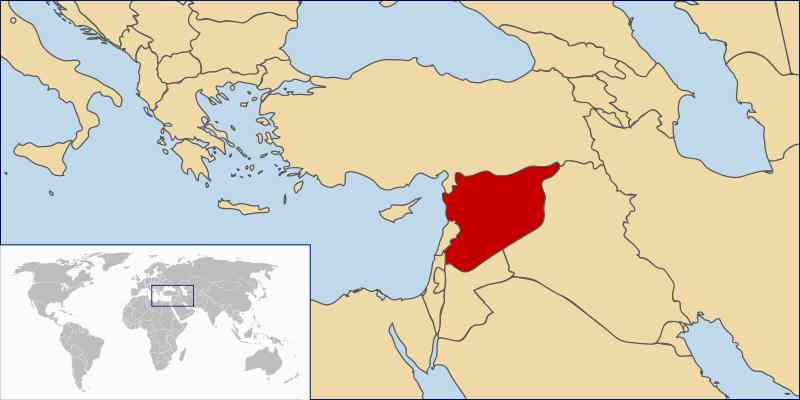
|
|
Capital
(and largest city)
|
Damascus
33°30′N
36°18′E
|
|
Official languages
|
Arabic
|
|
Government
|
Presidential
republic
|
|
-
President
|
Bashar
al-Assad
|
|
-
Prime Minister
|
Muhammad
Naji Etri
|
|
Independence
|
from
France
|
|
-
Declared (1)
|
September
19361
|
|
-
Declared (2)
|
January
1, 1944
|
|
-
Recognized
|
April
17, 1946
|
|
Area
|
|
-
Total
|
183,885
km² (88th)
71,479 sq mi
|
|
-
Water (%)
|
0.06
|
|
Population
|
|
-
July 2005 estimate
|
19,043,000
(55th)
|
|
-
Density
|
103/km²
(96th)
267/sq mi
|
|
GDP
(PPP)
|
2005
estimate
|
|
-
Total
|
$71.74
billion (65th)
|
|
-
Per capita
|
$5,348 (101st)
|
|
HDI (2004)
|
0.716 (medium) (107th)
|
|
Currency
|
Syrian
pound (SYP)
|
|
Time
zone
|
EET
(UTC+2)
|
|
-
Summer (DST)
|
EEST
(UTC+3)
|
|
Internet
TLD
|
.sy
|
|
Calling
code
|
+963
|
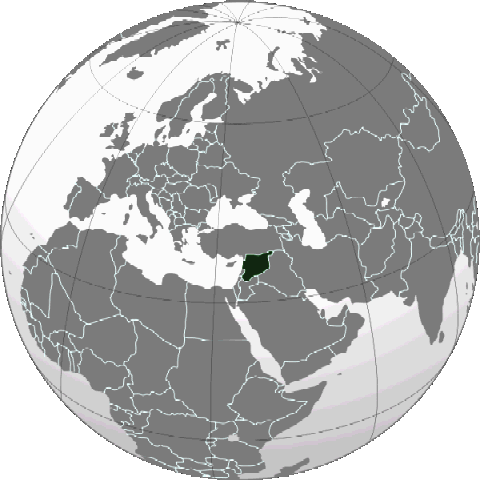
LINKS
and REFERENCE
http://www.bbc.co.uk/news/world-europe-23967567
Sponsoring
Terrorism: Syria and Islamic Jihad
http://www.iranmania.com/News/Article
http://www.janes.com/defence/news/jdw/jdw060627_1_n.shtml
Freedom
in the World 2006
(PDF). Freedom House
See also Freedom in the World 2006, List of indices
of freedom
https://www.cia.gov/cia/publications/factbook/geos/sy.html
Government
Syrian
Ministry of Foreign Affairs
The
Syrian Baath Party
Syrian
Parliament
Culture
The
Syrian National Film Organization
Syrian
General Organization of Radio and TV
Al
Assad National Library
Economy
Central
Bank of Syria
The
Commercial Bank of Syria
News
SANA
Syrian Arab News Agency
Government News Agency
Cham
Press
A complete roundup of news about Syria (in
Arabic & English)
Syria,
a Presidential Republic Under Military Rule Ynetnews
(Israeli newspaper) article about Syria
Syrian
Cities, towns & Villages websites
www.mshtawy.com
Mashta Al helou official town website)
GNU
Wikipedia
free license http://www.telegraph.co.uk/comment/telegraph-view/10291399/Britain-must-remain-an-outward-looking-nation.html http://www.telegraph.co.ukworldnews/middleeast/Syria-Russia-will-stand-by-Assad-over-any-US-strikes-warns-Putin Daily
Mail
Syria-Russia-vows-help-Syria-America-carries-military-strikes-Assad-s-regime
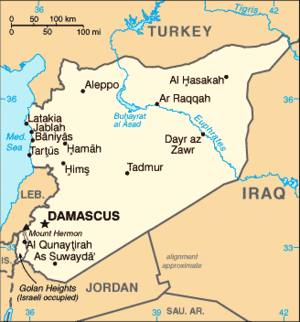
Map
of Syria
|
Adelaide
Aden
- Yemen
Afghanistan
Africa
Alaska
Albania
Algeria
Amazon
Rainforest
Amsterdam
Antarctic
- Scott
Arctic
North Pole
Argentina
Asia
Athens
Atlantis
- Plato's Lost City
Australia
Austria
Aztecs
- Mexico
Baghdad
Bahamas
Bahrain
Bangladesh
Barbados
Beachy
Head, England
Belgium
Benin
Berlin
Bermuda
Black
Rock Desert
Bohemia
Bolivia Bonneville
Utah History
Bonneville,
Utah, USA
Brazil
Brighton
- West Pier
British
Columbia
Buckingham
Palace
Bulgaria
Burkina
Faso
Burma
California
Canada
Canary
Islands
Cape
Horn
Cape
Verde
Cape
York - Au
Caribbean
Cayman
Islands
Central
Africa
Chichester
Harbour
Chile
China
Columbo
- Sri Lanka
Columbia
Corfu
Cowes,
Isle of Wight
Croatia
Crooked
Island, Bahamas
Cuba
Cyprus
Czechoslovakia
Darwin
- Australia
Daytona
Beach
Denmark
Eastbounre
Pier, England
Earthquakes
Ecuador
Egypt
Eindhoven Estonia
Equator
Europe
Falkland
Islands
Falmouth,
Cornwall
Fiji
Finland
Florida
France
Galapagos
Islands
Geography
Links
Geography
Mountains
Geography
Records
Geography
Resources
Geography
Statistics
|
Germany
Ghana
Gibraltar
- Links
Greece
Greenland
Guinea
Guinea
Bissau
Hawaii
Holland
the Nertherlands
Hollywood,
California, LA
Hong
Kong
Hungary
Hurricanes
Iceland
India
Indonesia
Links
Iran
Iraq
Ireland
Isle
of Man
Isle
of Wight
- The
Needles
Israel
Italy
Ivory
Coast
Jakarta
- Java
Jamaica
Japan
Johannesburg
Jordan
Kent,
England
Kenya
Korea
South Republic
Korea
North
Kuwait
Kyoto
Lanzarote,
Gran Canaria
Las
Vegas
Lebanon
Liberia
Libya
Liechtenstein
Life
on Earth
Lithuania
London
- Big
Ben
London
Eye
London
Houses
Parliament
London
- Buckingham
Palace
London
- Old
Bailey
London
- Overview
London
- The City
London
- Tower Bridge
London
- Trafalgar
Square
Luxembourg
Madame
Tussauds
Malaysia
Mali
Malta
Marshal
Islands
Mauritania
Maya
Empire -
Central America
Melbourne,
Australia
Middle
East
Mexico
Monaco
Morocco
Mountains
Mumbai
Naples-
Italy
National
Geographic
Nepal
New
York
New
Zealand
Niger
Nigeria
North
Africa
Norway
Nova
Scotia
Oceans
and Seas
Oman
Pakistan
Palermo
- Sicily
Palestine
Palma
- Malorca
|
Panama
Canal - Links
Paris
Pendine
Sands
Peru
Philippines
Pisa,
Leaning Tower
Planet
Earth
Poland
Port
Moresby - PNG
Port
Said - Egypt
Portugal
Puerto
Rico
Qatar
Quebec
Rio
de Janeiro
Romania
Rome
Russia
Salt
Lake City
Samoa
Saudi
Arabia
Scandanavia
Scotland
Senegal
Siera
Leone
Singapore
Solomon
Islands
Somalia
South
Africa
South
America
Southampton
Spain
- Espana
Sri
Lanka - Links
Stonehenge
Sudan
Suez
Canal
Sundancer
Holiday Resort
Sussex,
England Index
Sweden
Switzerland
Sydney,
Australia
Syria
Tahiti
- Polynesia
- Links
Tahitian
- Men & Women Customs
Taiwan
Thailand
The
Gambia
Togo
Tokyo,
Japan
Tonga
- Polynesia
Toronto
Trinidad
- Lesser Antilles
Trinidad
and Tobago
Tsunami
Tunbridge
Wells, England
Tunisia
Turkey
Tuvalu
Islands
UAE
- United Arab Emirates
UK
Statistics
Ukraine
United
Kingdom
United
Kingdom -
Gov
USA
Uruguay
Vanuatu
Islands
Vatican
City
Venezuela
Venice
Vienna
Vietnam
Volcanoes
Volendam
Wales
Washington
D.C.
WAYN
Where Are You Now
Wealden
iron industry
Wendover
West
Africa
World
Peace Supporters
Yemen
Yugoslavia
Zurich
|

Solar
Cola drinkers care about planet
earth
..
Thirst for Life

(330ml
Planet Earth can)
|
Syria
Travel, no thanks! - Youtube
|
The
Civil War - Youtube
|
|
Syria Chemical
Weapons - Youtube
|
Civil
War - Youtube
|
A
taste for adventure

A
heartwarming adventure: Pirate
whalers V Conservationists,
with
an environmental
message.
|








